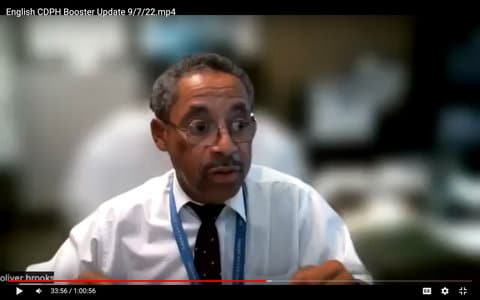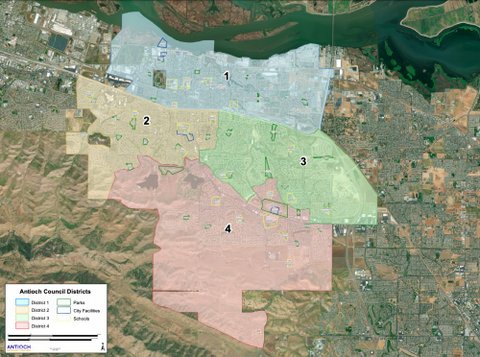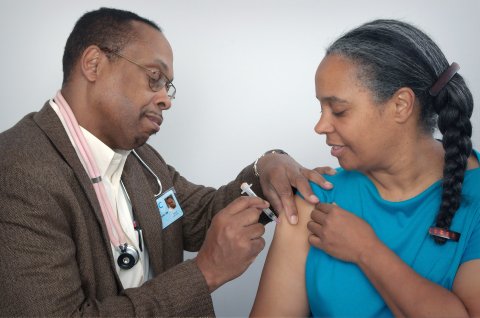
13 Sep The New and Improved COVID-19 Booster Shot Is Here

Dr. Oliver Brooks of Watts Healthcare described what he called the “three C’s of vaccine hesitancy” — confidence, convenience and complacency — during a Sept. 7 press teleconference on the new COVID-19 booster shot. (Screenshot captured by Danielle Parenteau-Decker / The CC Pulse)
By Danielle Parenteau-Decker
A new COVID-19 booster shot is now available. It was designed to provide more protection than its predecessor. The boosters are available in Contra Costa County at county-run sites in Antioch, Concord and Richmond and at other locations.
To be eligible, a person must be 12 or older, have completed their primary COVID-19 vaccine series, and have gotten their last shot at least two months before. That last shot can be from the initial series or a booster shot. The updated shot, which replaces the original booster, is what is called a bivalent vaccine. It guards against the original strain and omicron.
The “new vaccines are pulling double duty,” said Dr. Gil Chávez, deputy director of the Center for Infectious Diseases at the California Department of Public Health.
Chávez and three other doctors spoke Sept. 7 in a press briefing put on by CADPH’s Vaccinate All 58 campaign and Ethnic Media Services. The panelists talked about why some people choose not to get vaccinated — or to get the vaccine but not a booster shot.
Dr. Oliver Brooks, chief medical officer of Watts Healthcare in Los Angeles, said it comes down to the “three C’s of vaccine hesitancy”: vaccine confidence, vaccine convenience and vaccine complacency.
Vaccine confidence refers to whether people trust the vaccine or who is telling them to get it, Brooks said.
Dr. Maggie Park, the San Joaquin County public health officer, said some people think the “vaccines aren’t safe” because of “misinformation perpetuated in our communities.”
>>>Read: Mistrust and Misinformation Hold Back Black Vaccination Rates
“We know they are safe,” she said. Brooks called these vaccines a “biotechnological miracle.” Chávez said the FDA, CDC and Western States Scientific Safety Review Workgroup have all endorsed the new shot and that it “meets the FDA’s rigorous standards.”
Others think the “shots don’t work,” Park said, because they know someone who was vaccinated and even boosted but still got COVID-19.
“The critical importance of getting a booster is not because you don’t want to get a mild illness” but to prevent hospitalization and death, Chávez said. Vaccinated people can contract COVID-19 but are significantly less likely to become seriously ill.
Next is vaccine convenience: How easy is it to get? Does it cost? Are appointments necessary or hard to get? Will there be long waits?
But the biggest of these issues has now become vaccine complacency, Brooks said.
“People think COVID is over,” Park said. So they don’t think they need to get vaccinated. But this virus is “not going away.”
Another issue in the same vein is COVID fatigue. Park said many people are tired of thinking about the coronavirus and getting more shots, so they just ignore it.
For them, it “feels like there is no end,” she said. But “we need to be patient and protect ourselves.”
Dr. Eva Smith, medical director of the K’ima:w Medical Center on the Hoopa Valley Indian reservation in Humboldt County, said she was seeing those feelings among younger people. They’ve become complacent and tired, she said. They forgo getting vaccinated to avoid the “inconvenience of, ‘Yes, I’m going to be sore for a couple days.’ ”
Older reservation residents have not been so hesitant.
“When we first got the vaccine, the elders turned out. I was so impressed,” Smith said. “They didn’t want to die.”
She said Native cultures typically feature strong respect for the elders, but that isn’t coming through in vaccine attitudes.
“Why aren’t you listening to grandma?” Smith said she wants to ask younger people who aren’t getting vaccinated. “There’s a disconnect that I don’t quite understand.”
>>>Read: Older Adults Still At High Risk for COVID-19 — Beware Complacency
She also said the vaccine and booster are particularly important in her rural, remote community because many people have asthma or other health problems, and the area often has poor air quality because of wildfire smoke. If people get the sniffles or experience shortness of breath, they don’t know if it’s because of COVID, pollutants in the air or a preexisting condition.
Other people choose not to get vaccinated or boosted because they believe they can rely on natural immunity built up from prior exposure or infection.
Chávez said that the protection one does get from having had COVID-19 only lasts for about three months. “Relying solely on the immunity from infection is not a good idea.”
Some say they will take their chances and that they can just get therapeutics if they do get sick.
“The horse is out of the barn. You’re working backwards,” Brooks said. “Prevention is always better than treatment.”
Even if someone does not get very sick, they are still at risk of long COVID.
>>>Read: Long COVID Is Keeping People Sick Well After Infection
Brooks said he couldn’t imagine having symptoms such as headaches, brain fog and fatigue for months after recovering from COVID-19.
What’s more, as the coronavirus has evolved, it has become more highly transmissible, Park said. So even if an individual may not get very sick, it is not only their own health at stake.
“It’s not just about me,” Smith said. “It’s about we.”
The panelists also discussed making sure everyone who wants the vaccine or booster can get it.
In San Joaquin County, Park said her agency takes doses to people who may have trouble getting them otherwise, including farmworkers and people who do not have or cannot leave their homes. “We’ve really promoted them in our Latinx and African American churches.”
>>>Read: Churches Play Key Role in Getting Black People Vaccinated
Chávez said he believes there will be “ample supply” of the new booster and that the shots need to remain free so that cost cannot keep people from getting it.
The current funding that has made the vaccines and boosters free is set to run out as soon as January, CBS News reported earlier this month. Any additional funds would need to be approved by Congress, and that has not happened. The Biden administration has reportedly been discussing what to do when the money runs out. Leading vaccine manufacturers Pfizer and Moderna have said they have been getting ready to sell their doses. However, it is not yet clear what this could mean for people who may not be able to afford any future shots.
To find out more about the COVID-19 vaccine or booster or make an appointment, visit Contra Costa Health online. You can also find appointments by visiting Vaccines.gov or stores with pharmacies such as CVS, Safeway or Walgreens.






No Comments